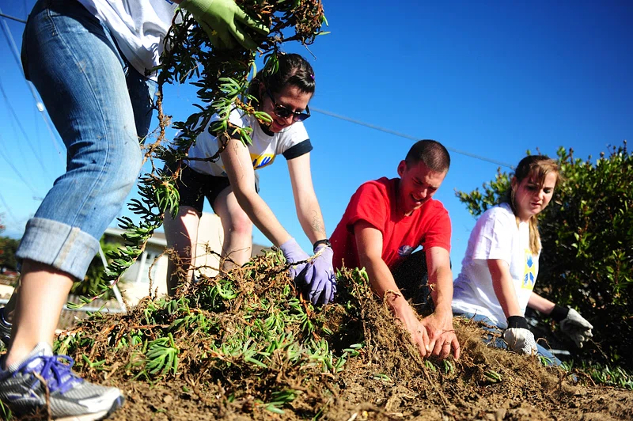
Building meaningful friendships in adulthood can be challenging, but it’s essential for mental and emotional wellbeing. This article offers practical strategies to build friendships, including putting yourself in social situations you enjoy, trying new activities, and becoming a master of the follow-up. Learn how scheduling social activities and prioritizing relationships can help you nurture meaningful connections and overcome adult loneliness.
- By Alan Heeks

In an uncertain future, growing community is essential for resilience. This article explores how collective action, inspired by nature's ecosystems, can strengthen communities. From wild margins to community-supported agriculture, diverse skills, mutual support, and inclusive participation are key to thriving in challenging times.

Is being alone the same as being lonely? New research suggests not. While physical isolation can impact some, particularly extroverts, many people thrive even when alone. This article explores why loneliness is distinct from simply being alone, the factors that influence it, and how maintaining social connections can mitigate feelings of loneliness during times of isolation.

Reconnecting with old friends can combat loneliness and improve social connections. Discover effective strategies to rekindle these valuable relationships and enhance your well-being.

Dear friend; I hold you gently in the quiet of my thought. The stillness tells me clearly that this crisis in your life, which most call a breakdown, is a listening time.

If you’ve ever gone through a friendship breakup you aren’t alone – one study from the US found 86% of teenagers had experienced one.

Middle-aged Americans are lonelier than their European counterparts. That’s the key finding of a recent study, published in American Psychologist.

Researchers have analyzed the relationship between loneliness and aloneness—and found that they are two different things that aren’t closely correlated.

Friends, family, lovers – these are three mainstays in our intimate lives. We typically expect familial relationships to be solid, essentially for life. In our romantic lives, we search for the “one” to be with for life.

In my teens and twenties, I didn’t think much about how important it was to like the people I worked with. At the time, I was working as a waiter at a Toronto diner and being friends with my colleagues was part of the experience.

New research on baboons reveals the independent effects of early life adversity and adult social relationships on survival. Discover how strong social bonds can buffer the negative effects of a difficult start and potentially improve lifespan in humans as well.
- By Emily Katz

Explore Aristotle's timeless wisdom on friendship, from reciprocal recognition to different types of friendships and the importance of maintaining friendship activities. Discover how his teachings on friendship still resonate in today's world.

Vivek Murthy, the US surgeon general, warns that “being socially disconnected” has a similar effect on mortality as smoking up to 15 cigarettes daily.

Male friendships are often presented in the media and popular culture as relatively superficial, competitive and lacking in emotional depth.
- By Alexis Blue

Smooches and snuggles may make us feel warm and fuzzy, but they can also be good medicine, says Kory Floyd.

If you’re feeling lonely, you’re not alone. Loneliness is an increasingly common experience, and it can have severe consequences. People who feel lonely are at higher risk of serious health issues, including heart disease, immune deficiency and depression.

Having a true friend (or several) in your life is a true gift. Having someone who you can call and say, "I am not doing well. I need your love," is a huge blessing

Friendship is a central part of the human experience. Our stories, our songs and our conversations are fabrics woven with threads of friendship.

If you are struggling to learn something new and you have people around who are not only unhelpful but downright negative about what you're doing, then you need to really look at each and every one and decide if each is truly a friend...

Friendships that bridge across social class – “cross-class friendships” – can minimize middle school academic achievement differences that are based on the level of parents’ education, according to research from the UCLA School Diversity Project.

In the far reaches of Canada’s North, there’s a different type of social distancing happening this year. Amid the lingering snowdrifts and bowed branches of spruce trees, a small mammal yells a ferocious “stay away!” call that can be heard more than 100 metres away.

It goes without saying that harming others does not a friendly community make. We can begin to refrain from doing harm while cultivating love and good relations. When we live with this value, we honor all with whom we...

Touch has profound benefits for human beings. But over the last few decades, people have become increasingly cautious about socially touching others for a range of reasons.

No more hugs? Rawpixel.com/shutterstock
Touch has profound benefits for human beings. But over the last few decades, people have become increasingly cautious about socially touching others for a range of reasons. With the novel coronavirus spreading, this is bound to get worse. The coronavirus could very well have long-term implications for how hands-on we are – reinforcing already existing perceptions that touch should be avoided.
Why is touch so important? It helps us share how we feel about others, enhancing our verbal communication. A touch on the arm when comforting someone, for example, is often what shows that we really care. People benefit from physical touch throughout their lifespan, and there is a large body of evidence showing that it has the ability to affect both short and long-term wellbeing. For babies, it is even crucial for healthy brain development.
The emotional impact of social touch is ingrained in our biology. There is evidence that it triggers the release of oxytocin, a hormone that decreases responses to stress. In fact, touch has been shown to cushion stress levels in humans.
We know that a simple touch by a nurse prior to surgery can reduce stress levels in patients. It can also reduce feelings of social exclusion and even increase food intake among elderly people living in a nursing home. So given how essential social touch is to people’s wellbeing, it is important to ensure that it is a part of everyday life.
Decline in social touch
The last few decades has seen a decrease in social touch. Partly, this is down to the fact that we are living in a technology-focused, socially disconnected world, where people are more likely to communicate virtually rather than through meeting in person. This means that we are touching each other much less than we used to.
But the decline in touch is primarily due to a fear that it may result in an accusation of inappropriate touching. Such fear has been moulded by society as people are frequently hearing stories of inappropriate behaviour. People therefore rather resist touching others than risk having a social touch misinterpreted. The message is simple: avoid hugging a work colleague who is upset and don’t pat someone on the back for a job well done.
At the same time, the fear of accusations of child abuse has been disproportionate to the number of actual occurrences. This has seen professionals developing distorted thinking. Teachers often avoid being alone with children, and don’t touch pupils in a natural and affectionate way.
The impact of coronavirus
With the novel coronavirus, people have yet another reason to be fearful of touching others, as it means approaching people who potentially may be carriers. While we should remain careful with touching during this serious outbreak, we have to make an effort not to let it get out of control. After all, a lot of people suffer from high levels of anxiety about the virus, and touch is a way to reduce it.

It won’t last forever. eldar nurkovic/Shutterstock
The longer this goes on, the more likely that an association will be formed between social touch and a sense of negativity. People may eventually forget all about the virus, but still be wary of social touch without knowing why. This is because negative associations often create more readily available memories for people than positive associations.
So while it is not advisable to carry on touching people as usual during the outbreak, especially not people who are old or have underlying health conditions, physical contact with loved ones can still continue, as long as we take precautions.
More broadly, the key is to be aware that negative life events such as this epidemic could impact on social touch in the long run in an undesirable way. Bringing this to the forefront of our minds can counterbalance what may otherwise generate negative memories about touch.
Once the outbreak is over, one vital challenge will be to reset our thinking about touch, keeping in mind its importance. After all, a hug may be just what we need to move on from the traumatic experience of the coronavirus.
About the Author
Cathrine Jansson-Boyd, Reader in Consumer Psychology, Anglia Ruskin University
This article is excerpted from a longer article from The Conversation under a Creative Commons license. Read the original article.

Related Books:
The Five Love Languages: The Secret to Love That Lasts
by Gary Chapman
This book explores the concept of "love languages," or the ways in which individuals give and receive love, and offers advice for building strong relationships based on mutual understanding and respect.
Click for more info or to order
The Seven Principles for Making Marriage Work: A Practical Guide from the Country's Foremost Relationship Expert
by John M. Gottman and Nan Silver
The authors, leading relationship experts, offer advice for building a successful marriage based on research and practice, including tips for communication, conflict resolution, and emotional connection.
Click for more info or to order
Come as You Are: The Surprising New Science that Will Transform Your Sex Life
by Emily Nagoski
This book explores the science of sexual desire and offers insights and strategies for enhancing sexual pleasure and connection in relationships.
Click for more info or to order
Attached: The New Science of Adult Attachment and How It Can Help You Find—and Keep—Love
by Amir Levine and Rachel Heller
This book explores the science of adult attachment and offers insights and strategies for building healthy and fulfilling relationships.
Click for more info or to order
The Relationship Cure: A 5 Step Guide to Strengthening Your Marriage, Family, and Friendships
by John M. Gottman
The author, a leading relationship expert, offers a 5-step guide for building stronger and more meaningful relationships with loved ones, based on principles of emotional connection and empathy.















